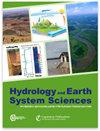利用LSTM模型预测莱茵-默兹三角洲河口盐入侵
IF 5.8
1区 地球科学
Q1 GEOSCIENCES, MULTIDISCIPLINARY
引用次数: 0
摘要
摘要河口盐的入侵导致许多三角洲的淡水供应出现问题。水管理人员需要及时和准确的预测,以便能够减轻和适应盐入侵。由机器学习衍生的数据驱动模型非常适合这种情况,因为它们可以模拟复杂的非线性系统,并且计算效率很高。我们建立了一个长短期记忆(LSTM)模型来预测荷兰莱茵-默兹三角洲的盐入侵。该模型的输入是在九个地点测量的氯化物浓度、水位、排放物和风速。它预测了未来7天克里姆彭湖(一个重要的淡水供应地点)每日最低、平均和最高氯化物浓度。该模型很好地预测了基线浓度和峰值时间,但峰值高度被低估了,这个问题随着提前时间的增加而变得更糟。在1到7天的交货期之间,预测精度从0.9下降到0.7,预测召回率从0.7下降到0.5。鉴于这些结果,我们的目标是将该模型扩展到三角洲的其他地区。我们希望类似的设置可以在其他delta中工作,特别是那些具有类似或更简单的通道网络的delta。本文章由计算机程序翻译,如有差异,请以英文原文为准。
Forecasting estuarine salt intrusion in the Rhine–Meuse delta using an LSTM model
Abstract. Estuarine salt intrusion causes problems with freshwater availability in many deltas. Water managers require timely and accurate forecasts to be able to mitigate and adapt to salt intrusion. Data-driven models derived with machine learning are ideally suited for this, as they can mimic complex non-linear systems and are computationally efficient. We set up a long short-term memory (LSTM) model to forecast salt intrusion in the Rhine–Meuse delta, the Netherlands. Inputs for this model are chloride concentrations, water levels, discharges and wind speed, measured at nine locations. It forecasts daily minimum, mean and maximum chloride concentrations up to 7 d ahead at Krimpen aan den IJssel, an important location for freshwater provision. The model forecasts baseline concentrations and peak timing well but peak height is underestimated, a problem that becomes worse with increasing lead time. Between lead times of 1 and 7 d, forecast precision declines from 0.9 to 0.7 and forecast recall declines from 0.7 to 0.5 on average. Given these results, we aim to extend the model to other locations in the delta. We expect that a similar setup can work in other deltas, especially those with a similar or simpler channel network.
求助全文
通过发布文献求助,成功后即可免费获取论文全文。
去求助
来源期刊

Hydrology and Earth System Sciences
地学-地球科学综合
CiteScore
10.10
自引率
7.90%
发文量
273
审稿时长
15 months
期刊介绍:
Hydrology and Earth System Sciences (HESS) is a not-for-profit international two-stage open-access journal for the publication of original research in hydrology. HESS encourages and supports fundamental and applied research that advances the understanding of hydrological systems, their role in providing water for ecosystems and society, and the role of the water cycle in the functioning of the Earth system. A multi-disciplinary approach is encouraged that broadens the hydrological perspective and the advancement of hydrological science through integration with other cognate sciences and cross-fertilization across disciplinary boundaries.
 求助内容:
求助内容: 应助结果提醒方式:
应助结果提醒方式:


